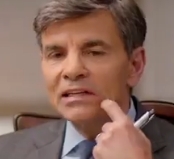(OPINION) — In the spring of 2018, ABC News aired a much-hyped, two-hour prime-time special featuring George Stephanopoulos interviewing former FBI Director James Comey. Promoted as a deep dive into Comey’s memoir “A Higher Loyalty,” the session revisited pivotal 2016 decisions, from the Clinton email probe to the Russia investigation’s origins.
This was not malice but the worst kind of journalism: omissions cloaked in fairness, leaving viewers with a sanitized narrative of justified investigations, not procedural shortcuts tinged with politics.
This is JJChronicles.com analysis and opinion of that interview:
An interview that masquerades as rigorous journalism but, upon reevaluation, scores a dismal 4 out of 10 against the Society of Professional Journalists’ Code of Ethics.
More troubling, it exemplifies ABC’s — and parent company Disney’s — persistent failure to confront institutional bias, eroding public trust in a network of once synonymous with straight-shooting broadcasts.
Initial Assessment: A Promising Start
The thought process in scoring began with optimism. An initial rating of 8/10 credited the interview’s length — a lengthy raw session yielding a full transcript release — and moments of candor, like Comey admitting “mistakes” in his Clinton characterization as “extremely careless” rather than prosecutable “gross negligence.”
Stephanopoulos pressed on parallels to the David Petraeus case, where mishandling classified material led to charges, and queried Comey’s assumption of a Hillary Clinton victory influencing his infamous October letter to Congress. These exchanges upheld the SPJ’s “Seek Truth and Report It” principle: accurate, fair testing of power with public interest at the fore. “Minimize Harm” held at 9/10 for respectful treatment without sensationalism, while “Be Accountable and Transparent” earned 8/10 for the unedited footage, a rare nod to openness.
This is purely an opinion of that interview: It masquerades as rigorous journalism but, upon reevaluation, scores a dismal 4 out of 10 against the Society of Professional Journalists’ Code of Ethics.— Analysis of the Comey Interview
Cracks in the Foundation: Independence Under Fire
But scrutiny revealed cracks. Reevaluating against “Act Independently,” Stephanopoulos’s undisclosed Clinton White House tenure — as communications director from 1993-1997 — loomed large.
Questions on the Steele dossier’s Clinton campaign funding stayed superficial; he asked if Comey told President-elect Trump it was opposition research but skipped follow-ups on FBI vetting or potential FISA abuses.
This dropped independence to 7/10, then lower, as comparisons surfaced: Stephanopoulos’s Trump interviews, like the 2019 grilling on obstruction (“A president can’t obstruct justice?”), were interruptive and relentless, eliciting defensive rants. Comey, by contrast, pivoted unchallenged to Trump as “morally unfit,” a soundbite that dominated coverage without equal pushback.
The Shadow of Omissions
Further downgrades came from omissions’ long shadow. The interview implied the Russia probe’s legitimacy, glossing over the dossier’s unverified claims — later critiqued in the 2023 Durham report for FBI overreliance on Democratic-funded intel. This was not malice but the worst kind of journalism: omissions cloaked in fairness, leaving viewers with a sanitized narrative of justified investigations, not procedural shortcuts tinged with politics.
Truth-seeking fell to 7/10, then 4/10, as the softballs provided book-promo cover for Comey while shielding ABC from bias accusations. Harm minimization dipped to 6/10, amplifying institutional cynicism; accountability to 6/10, for promo hype over self-reflection.
Stephanopoulos’s Trump interviews, like the 2019 grilling on obstruction (“A president can’t obstruct justice?”), were interruptive and relentless, eliciting defensive rants. Comey, by contrast, pivoted unchallenged to Trump as “morally unfit,” a soundbite that dominated coverage without equal pushback.
A Failing Grade and Broader Implications
Overall, 4/10 signals failure across SPJ pillars. Access and production values do not falter — those shine — but the uneven rigor, perceived favoritism and narrative shaping betray independence. ABC, under Disney’s entertainment-driven umbrella since 1996, has faced serial bias claims: from Stephanopoulos’s pivot from operative to anchor without full reckoning, to uneven 2020 election coverage critiques.
Disney’s response? Incremental training, not structural overhaul. This interview, six years on, underscores the stasis: a network prioritizing star power over ethical fortitude, in an era demanding transparency to rebuild faith. Until ABC mandates conflict disclosures and balanced scrutiny — Trump-tough for all — such pieces will linger as symptoms of a deeper malaise.
Stephanopoulos who cost Disney millions after he the corporation settled with Trump, continues to display astounding bias and failures in following SPJ ethics. CEO Robert Iger appears not concerned with ongoing journalistic failures at ABC News. In fact, just this week, ABC News “veteran journalists” believe criticism of news operations is an attack on free speech by the administration.
